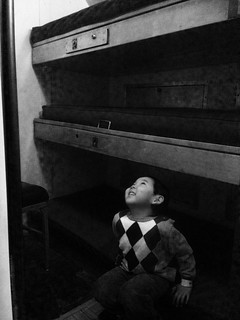The underlying issue is that he is an introvert, and pre-elementary assessments are designed based on an outgoing child who will actually present the knowledge he/she has to the assessor. But, while the majority of preschoolers in any grouping (say, a daycare or preschool) are wild and rambunctious, T had always been the quiet one who stayed in one place. As a 2 and 3 year old his play at day care or in group settings was marked by him staying in one place as the other kids would swarm from play area to play area around him. And the kids realized this too. His most common playmates were also the quiet ones who did not swarm as fast as the others (e.g. girlfriend from the 2year old room was also a shy one, and there are three boys that the staff have marked as hanging around together instead of participating in the usually rowdyness of preschool boys.)
The question is what do we do as someday he will be assessed, and there will be an outcome of the assessment. And that, especially in the pre-elementary and elementary stages, the assessment will be done in a way that greatly favors the extrovert (est 75% of the U.S. population). Some things that we have been trying include playing piano (he plays happily at home, but in any other location, he maintains excitement until he gets close to the piano in question, then he freezes.), activities in busy areas (the regular museum visits offer many opportunities to interact, in fact it is hard to avoid the other kids, but he clams up as he gets close to interacting with anyone, even after watching us do so many times in many contexts.), play dates (we have not had that many, most of the neighborhood is older, there is one neighbor only 2 years older who really likes playing with T, but she is very much the extrovert and it does not help whne movin to a new setting. There is one sense that it does not matter, that T will learn enough how to function in an extroverted world in time for it to matter, but another thought is that time may not be that far into the future.
In other developments, A has become quite the talker. In addition, she has developed a sense of will where there are times where she can decide to want something, and make deliberate and sustained efforts to get it. And as part of that, the first stage of mobility, she can roll both clockwise and counterclockwise at will.
T's main development was moving up to Pre-K from the 3s room. This actually was an issue as the Pre-K in our daycare had maxed out the capacity of the room. We were part of a minor rebellion threatening to leave enmasse until they created a new class of Pre-K. There is an issue as the additional class starts out the day using a room that is also used by an afterschool program, so they need to move back into the regular Pre-K/3s room before the public school kids (kindergarden is halfday in W Pa.) return. So it is a lot of moving around, but at least T spends time with older kids again.
.
In other developments, A has become quite the talker. In addition, she has developed a sense of will where there are times where she can decide to want something, and make deliberate and sustained efforts to get it. And as part of that, the first stage of mobility, she can roll both clockwise and counterclockwise at will.
T's main development was moving up to Pre-K from the 3s room. This actually was an issue as the Pre-K in our daycare had maxed out the capacity of the room. We were part of a minor rebellion threatening to leave enmasse until they created a new class of Pre-K. There is an issue as the additional class starts out the day using a room that is also used by an afterschool program, so they need to move back into the regular Pre-K/3s room before the public school kids (kindergarden is halfday in W Pa.) return. So it is a lot of moving around, but at least T spends time with older kids again.
 |
| Turning the wheel of the USS Requin (SS-481) |
 |
| These beds are small |
No comments:
Post a Comment